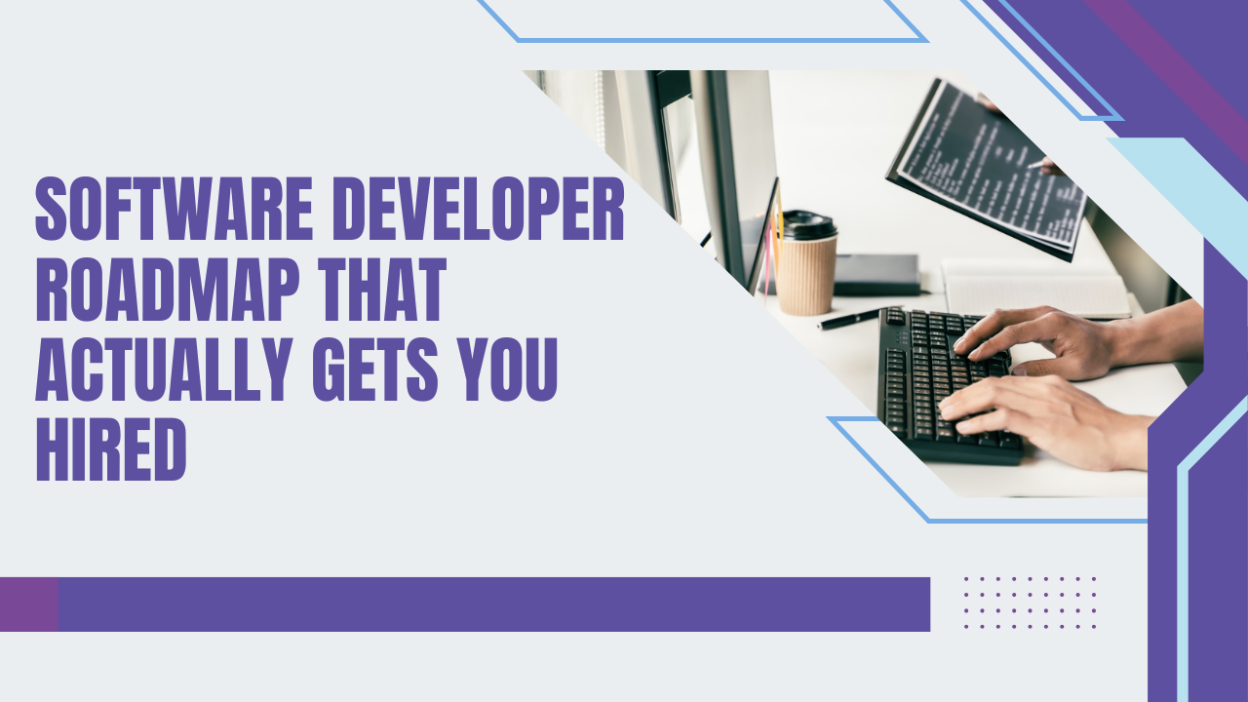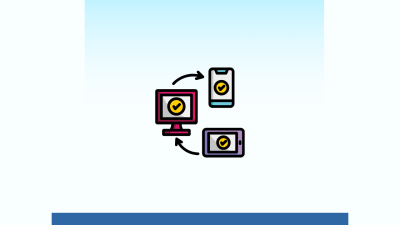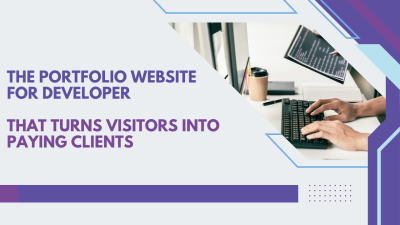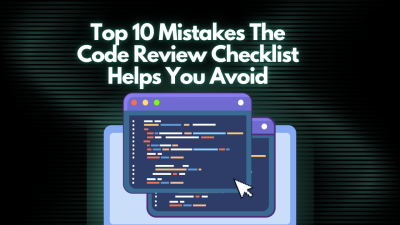I’ve spent years in the software development world, and if there’s one thing I’ve learned, it’s that a well-laid-out roadmap is your best friend when trying to break into this field. But here’s the thing— a roadmap isn’t just about the technical skills you need to learn.
It’s about mapping out your journey, understanding where you’re headed, and making sure you’re taking the right steps to get there. Over the years, I’ve seen what works, and I’ve seen what doesn’t. So, let’s dive into the real software developer roadmap that will get you hired.
Table of Contents
Master the Basics – The Foundation of Your Developer Roadmap
Without a strong foundation, the rest of your journey will be a struggle. As a developer, you need to know the basic tools of the trade before you can start building complex systems.
- Learn Programming Languages: I started with Python, but you can choose what works best for you. Whether it’s Python, JavaScript, or Java, mastering one language will set you up for success. Once you understand one, learning others becomes a breeze. The software developer roadmap I followed always began with mastering the fundamentals of at least one language.
- Understand Computer Science Basics: When I first learned about data structures and algorithms, it completely changed my approach to coding. These concepts are the backbone of problem-solving. Trust me, having these in your toolkit will make tackling interviews so much easier. This is one step I always include in my software developer roadmap.
- Version Control with Git: I remember when I first used Git — it felt like a game-changer. If you don’t know how to use Git, you’re going to face major hurdles. I highly recommend getting comfortable with GitHub and version control right from the start. This is a fundamental skill in my software developer roadmap.
Build Practical Projects – Start Creating Real-World Apps
Here’s where things get exciting. The software developer roadmap isn’t just about learning theory. It’s about putting what you’ve learned into action. Start building stuff. Real stuff. Stuff that can solve problems.
- Start Small: When I first started building projects, I kept it simple. I didn’t jump into big complex systems; I worked on a to-do list app or a weather app. These small wins built my confidence and showed me how to translate knowledge into functional projects.
- Work on Open Source Projects: I can’t recommend this enough. Contributing to open-source projects helped me level up faster than anything else. You’ll get real-world experience, work with other developers, and learn a lot along the way. This is one of my go-to recommendations in the software developer roadmap.
- Create a Portfolio: I made sure to showcase my best work on my portfolio. Your portfolio is your online resume. When I was job hunting, this was the first thing I showed to potential employers. Keep it updated with your best projects. A strong software developer roadmap includes a solid portfolio that highlights your growth.
Learn the Tools of the Trade – Enhance Your Developer Roadmap with Powerful Tools
Knowing the right tools can make a huge difference in your development process. Here’s how to make sure you’re using the best tools for the job.
- Master Databases: When I first encountered databases, it felt overwhelming. But once I understood relational and non-relational databases, things clicked. Whether it’s MySQL, PostgreSQL, or MongoDB, make sure you’re comfortable with at least one. This is a crucial part of the software developer roadmap that I always emphasize.
- Get Comfortable with Frameworks: I learned React early on, and it made building web apps so much easier. If you’re working with JavaScript, you’ll want to pick a framework like React or Angular. Frameworks are like power tools for developers. In my software developer roadmap, learning frameworks was a game-changer.
- Learn DevOps Basics: DevOps was one of the skills that helped me take my development to the next level. Understanding how to deploy your apps and manage cloud environments (AWS, Google Cloud, Azure) will make you a more well-rounded developer. I always suggest including DevOps basics in your software developer roadmap.
Focus on Problem-Solving Skills – The Heart of Your Software Developer Roadmap
As a software developer, your main job is to solve problems. It’s not just about writing code; it’s about solving real-world issues with the code you write. If you want to succeed, focus on your problem-solving ability.
- Practice Coding Challenges: I did a ton of coding challenges when I was preparing for interviews. Sites like LeetCode and HackerRank helped me develop the problem-solving mindset I needed. These challenges test more than just your technical knowledge — they challenge your creativity. The software developer roadmap I used had this as a key practice.
- Understand Time and Space Complexity: When I first started learning big-O notation, it seemed confusing, but once I got the hang of it, my coding became much more efficient. It’s a game-changer when it comes to optimizing code. This concept is key in my software developer roadmap and will set you apart in interviews.
- Tackle Real-Life Problems: I used to build small tools for myself to automate repetitive tasks, and it made me feel like a real developer. Try tackling real-world problems, like building a calendar app or an expense tracker. This will improve your skills and give you something concrete to show on your software developer roadmap.
Stay Consistent – Keep Moving Forward on Your Developer Roadmap
Consistency is key. Whether you’re learning new technologies, solving problems, or working on projects, always make progress — even if it’s just a little bit each day.
- Set Small Goals: I set small, achievable goals each week. Whether it was learning a new framework or finishing a coding challenge, these small wins kept me motivated. This is a huge part of the software developer roadmap I followed, and it really helped me keep moving forward.
- Keep Up with Industry Trends: The tech world moves fast. I made it a point to read blogs, watch videos, and listen to podcasts to stay updated. This is something I always recommend in any software developer roadmap — staying on top of new trends and technologies keeps you competitive.
- Keep Learning: I didn’t stop learning once I got a job. In fact, that’s when I really started diving deep into new technologies. A software developer roadmap should never have an end point. There’s always something new to learn.
Prepare for Interviews – Nail the Job Search Part of Your Developer Roadmap
Alright, you’ve got your skills. You’ve built projects, learned the tools, and solved problems. Now it’s time to get out there and actually land that job.
- Perfect Your Resume and LinkedIn: I spent a lot of time tweaking my resume to highlight my skills and projects. It’s not just about listing technologies; it’s about showing how you’ve used them to make a real impact. The software developer roadmap I used always included updating my resume and LinkedIn to reflect my growing experience.
- Practice Behavioral Questions: I learned early on that interviews are about more than just technical skills. I practiced answering questions about teamwork, handling pressure, and problem-solving. Knowing how to answer behavioral questions made a huge difference. This part of the software developer roadmap is essential.
- Mock Interviews: I did mock interviews to get comfortable with the process. Practicing with a peer or mentor helped me refine my responses and get feedback. A software developer roadmap is incomplete without this step, as it builds confidence for the real interviews.
Network – Let the Right People Know You’re Ready
Networking isn’t just about collecting business cards. It’s about building relationships with the people who can help you on your software development journey.
- Join Developer Communities: I connected with other developers through forums and social media groups. It was an invaluable resource for advice, job leads, and learning new tricks. Networking is a huge part of any software developer roadmap, and it’s where many job opportunities arise.
- Connect with Hiring Managers and Recruiters: I wasn’t shy about reaching out to recruiters and hiring managers. I made sure they knew about my skills and what I was working on. Don’t be afraid to make connections and share your work — it could lead to your dream job. Networking is a key element in your software developer roadmap.
Stay Patient and Persistent – It’s a Marathon, Not a Sprint
Breaking into software development can feel overwhelming at times. You might not land your dream job on the first try, but trust me, persistence pays off. Stick to your software developer roadmap, and keep improving.
- Embrace the Journey: I always reminded myself that becoming a software developer wasn’t a race. There would be challenges along the way, but every setback taught me something valuable. Stay patient, stay focused on your software developer roadmap, and enjoy the process.
- Stay Positive: I didn’t let rejections get me down. They were learning experiences. Every “no” I received got me closer to a “yes”. The software developer roadmap I followed was about keeping a positive attitude, even when things didn’t go as planned.
Focus on Clean Code – Write Code That’s Easy to Read and Maintain
As a developer, one of the most valuable things I’ve learned is the importance of writing clean, maintainable code. It’s not just about solving the problem; it’s about making sure your code is readable and scalable.
- Follow Best Practices: I made a habit of following coding standards, whether it was naming conventions or keeping functions small and focused. Clean code isn’t just for the computer — it’s for your future self and your team. It’s an essential part of any software developer roadmap.
- Write Descriptive Comments: I started adding meaningful comments when my code wasn’t immediately obvious. It made collaboration smoother and helped others (and me) understand what I was doing. Clean, well-commented code is a game-changer when you’re working on a team project.
- Refactor Often: As I worked on projects, I kept going back and refactoring my code to make it cleaner. A solid software developer roadmap includes refactoring to keep your codebase in good shape for future growth.
Focus on User Experience (UX) – Build with the User in Mind
As a software developer, you could be building the most technically complex product, but if the user experience isn’t great, your app won’t be successful. I’ve learned the value of designing with the user in mind early in my career.
- Understand UI/UX Basics: I realized that knowing a bit about UI/UX design made my apps much more user-friendly. I recommend picking up some basic design principles, like understanding color schemes, typography, and layout. The software developer roadmap I followed included designing simple but effective user interfaces.
- Think About the End-User: When coding, I always considered how the user would interact with my app. Would it be intuitive? Would the experience be seamless? Keeping the user at the forefront of development is a must in any software developer roadmap.
Develop Soft Skills – Become a Well-Rounded Developer
When I first got started, I focused entirely on technical skills, but over time I learned that soft skills are just as important, if not more so. The best developers can communicate their ideas clearly, collaborate well, and solve problems with their team.
- Improve Communication Skills: I worked on becoming a better communicator, whether it was explaining complex technical concepts to non-developers or discussing technical solutions with my team. Strong communication is crucial in the software developer roadmap because it helps build trust and teamwork.
- Work on Teamwork: I realized that software development isn’t a solo gig. Being able to work effectively within a team is key. In my software developer roadmap, I intentionally worked on building relationships and collaborating with others to produce better outcomes.
Learn to Debug Like a Pro – Troubleshooting is Key
One skill I didn’t focus on enough early on was debugging. The reality is, you will spend a large chunk of your time troubleshooting and fixing bugs. Getting good at debugging will save you hours and keep your codebase running smoothly.
- Master Debugging Tools: I became friends with the debugging tools in my IDE and got comfortable using breakpoints and watching variables. These tools helped me get to the root of issues faster. Debugging is a big part of your software developer roadmap because the faster you debug, the more efficient you are.
- Follow a Methodical Approach: I learned to troubleshoot step-by-step rather than jumping to conclusions. It helped me solve problems faster and more effectively. A solid software developer roadmap includes building strong debugging habits that will make your job easier.
Explore Cross-Disciplinary Knowledge – Become a T-Shaped Developer
I noticed that some of the most successful developers I met had skills outside of just programming. They had a broader understanding of how different fields connect, from design to business. I highly recommend expanding your knowledge beyond just coding.
- Learn a Little Bit About Design: I found that learning about front-end design helped me become a more complete developer. Understanding how HTML, CSS, and JavaScript work together to build user interfaces made me a more versatile developer. The software developer roadmap I’ve followed always included some design basics.
- Get to Know the Business Side: Understanding how businesses operate helped me align my coding work with business goals. When I started thinking about how the products I was building would benefit the company’s bottom line, it helped me make better decisions and communicate more effectively with stakeholders.
Conclusion
I can confidently say that if you follow this software developer roadmap, you’re setting yourself up for success. From mastering the basics to building practical projects, learning the tools, and staying consistent — each step is important. The best part? It’s a journey, not a destination. Keep learning, keep building, and most importantly, keep having fun with it.
Frequently Asked Questions
1. How do I start learning programming as a beginner?
Start by choosing a language like Python or JavaScript. Focus on learning the basics first, such as variables, loops, and functions. Then, practice by building simple projects.
2. What are the best ways to improve coding problem-solving skills?
Practice coding challenges regularly on platforms like LeetCode and HackerRank. Also, work on understanding algorithms and data structures to improve your problem-solving abilities.
3. How important is it to build a portfolio as a developer?
Building a portfolio is essential. It allows you to showcase your skills through real-world projects, which helps you stand out to employers and demonstrate your experience.
4. Do I need to learn soft skills to succeed as a developer?
Yes, soft skills like communication and teamwork are crucial. Being able to clearly explain your ideas and collaborate with others is just as important as coding skills in a developer’s career.
5. How can I stay motivated during my software development journey?
Set small, achievable goals and keep progressing every day, no matter how small. Stay consistent, embrace setbacks as learning opportunities, and remember to enjoy the journey.
6. How long does it take to get hired as a developer?
With consistent effort, you can become job-ready in 6–12 months by following a solid roadmap and building real projects.




